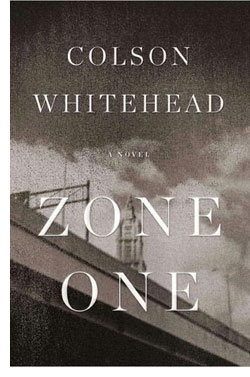 |
 |
 Colson Whitehead
Colson Whitehead
Zone One
Reviewed by: Rick Kleffel © 2011
Doubleday / Random House
US Hardcover First Edition
ISBN 978-0-385-52807-8
Publication Date: 10-18-2011
262 Pages; $25.95
Date Reviewed: 10-29-11
Index:
Science Fiction
Fantasy
General Fiction
From a certain perspective, our death begins with our birth. Everything in-between is drudgery, bookended by the unknown. On a bigger scale, we're concerned with not just our end, but the demise of everything because, so far as we can tell, it has already happened. We're just going through the motions, mostly sans emotions, waiting for the Apocalypse, personal or general.
The problem for the writer who wants to work with these long thoughts is that crafting an entertainment out of colors dark and darker is particularly challenging. Colson Whitehead's 'Zone One' starts just after the end. In this case, a plague has devastated the world, turning most humans into zombies who infect others or kill them. Once most of the damage has been done, those left behind are not immersed in a first-person shooter video game. Instead, they're janitors of the dead, which proves to be chilling, poignant, funny and ultimately quite entertaining.
Mark Spitz (you do find out how he got the iconic name in the course of the narrative) is not a hero by any means. In fact, he, like many of the survivors, exhibits what White calls "a strange facility for the mandatory." It seems that the Apocalypse has weeded out all but the average. Mark, Gary and Kaitlyn comprise Omega Unit, sent by the bureaucracy in Buffalo to clean up Zone One in New York. Not surprisingly, the bureaucracy gets some things wrong, and a simple job is complicated to a life-threatening level.
Whitehead creates a convincing day-after-tomorrow Apocalypse with an intricate storytelling style, weaving back and for the between memories of the past and the drudgeries of the present. Spitz, Gary and Kaitlyn are all affectingly normal characters. Their very lack of heroic, outstanding character traits gives the reader a very accessible entry point into Whitehead's world. They play their cards close to the chest, and try not to take unnecessary chances. Whitehead gives us emotionally-charged scenes set in his character's past (our present) as he takes us deeper into the ever-more absurd world he has created. We really care about the characters in the novel, because they're from our world and marooned in the aftermath.
Even as Whitehead keeps us close to the characters, his prose stands out. This is the sort of novel that comes with lots of sentences you want to write down, and scenes that stick in your head. The prose is part and parcel with Whitehead's world-building, and both offer him ample opportunities for humor. In Whitehead's future, everyone is diagnosed with Post Apocalyptic Stress Disorder (PASD), the symptoms of which boil down to being both human and alive. The survival of civilization is quickly followed by the rebirth of bureaucracy, which seems to have not learned anything from the fall. Whitehead has a grand time with all this, playing it straight but setting up lots of great jokes and riffs. Language and world-building work hand-in-hand to define a future not so different from the past. There are just fewer people and more zombies.
Of course, there is more adventure as well, combing through buildings for stragglers, zombies who are not rabid killers but essentially statues, fixated on some inconsequential task from their past lives. Whitehead manages to make these scenes hilarious and poignant in the same (lack of) breath. He plays with the genre as well, giving us slow zombies and the ever-present signal from afar that may indicate things are not as bad as they seem — or worse.
'Zone One' is not like any other zombie novel you're likely to read. Even though it has all the accoutrements of the genre, Whitehead's interests and skills are always on display. Indeed, Whitehead manages a very unique feat here. He ends civilization in buckets of blood, and finds afterwards a world very much like those he has created in his other works. 'Zone One' does not wallow in gore and revel in mayhem. The Apocalypse, we learn, simply clears the way for the triumph of the mundane, which proves to be funnier and more frightening than buckets of blood.
|
 |
|
|
 |
| |
Review Archive
All Reviews alphabetized by author.
General Fiction
Non-Genre, general fiction and literature.
Horror
Supernatural fiction, supernatural horror and non-supernatural horror.
Science Fiction
Science fiction, science fantasy, speculative fiction, alternate history.
Fantasy
Fantasy, surrealism and magic realism.
Mystery
Crime, thrillers, mystery, suspense.
Non-Fiction
Non-Fiction, True Crime, Forteana, Reference.
Poetry
|
|
 |
|




